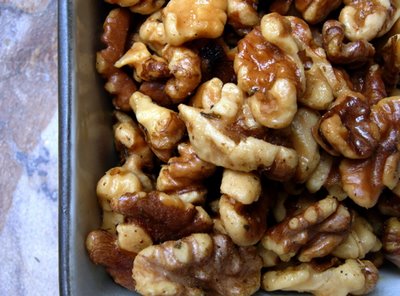
I realized a few years ago I was no longer tasting my food as I cooked. I would smell it, watch it, even listen to it, but as long as I was confident of the flavorings, I usually didn't taste it until it was time to eat.
Cranky would ask, "How's it taste?" and I'd say, "I don't know; all right, I think." Yeah, mostly all right.
I don't do this all the time, of course. Sometimes I'm uncertain where a dish is going, and I have to taste and adjust as I go. Other times I can hardly restrain myself from shoveling spoonfuls into my mouth, strictly for scientific purposes, you understand.
If the texture of food is important, I primarily let my teeth and tongue be the judge. I say "primarily," because yesterday I let my hands be the judge. It was a grilled pork tenderloin, and I pulled it off the fire when I liked the developing firmness in the meat, as judged by pinching and poking it. It worked perfectly: Lightly caramelized outside, a ring of creamy white inside, and a gentle rosy center. Juicy and tender, no thermometer required.
The other day I used my nose to roast some fresh walnuts (harvested in November). I seasoned them with salt, dried oregano, cayenne, cumin and olive oil, and then popped them in a 350ºF oven for about six or seven minutes. The aroma began to rise, but it wasn't quite there. I pulled the nuts out, gave them a stir, and put them back in for another five minutes or so until the smell drove me, well, nuts. Bingo: Fresh, toasty, perfect.
We all know how important the look of food is as it cooks, not even counting the value of choosing beautiful colors and arrangements when we serve it. Cookies have to turn golden, scrambled eggs need to achieve a gentle, glossy curd, etc., etc.
But I'm still working on the sense of hearing when I cook. I've heard tales of "knowing" when a pot of something or other is nearing perfection because the sound of the simmering changes. I think there are other, even more clever, cues from listening to food cook, but I don't know what they are.
The only simmer-nearing-perfection I've mastered is the sound of water coming to a boil in the teakettle — I can tell by a sudden cessation of hissing that it's just about to whistle. That doesn't really buy me much, but it's a start.
Anybody got any anecdotes?



6 comments:
Well, there is a specific kind of "ssst" sound when you try a piece of dredged chicken in hot bubbling oil when you want to see whether it's ready for frying. It's something you have to learn by doing. (The same applies for battered veggies, fish, etc., but the chicken seems more dramatic, always.)
I just read a H. Blumenthal recipe for a salad and the last paragraph began, "Finish the salad by tasting." All the ingredients were listed, but the amounts were to be evaluated with each addition.
"Put on your listening ears, children....."
That's a good one. I try a test piece to see if it's going quickly enough (or too quickly), but I just realized I subconsciously rely on the sound, too. A weak "zzz" and you're going to get flab, with the batter floating away. You brought it to my conscious attention.
(Oh, then there's the sense of feel with fried chicken: Splattering hot oil!)
I love the sensuality behind this post! I wholeheartedly agree Cookie Crumb, cooking is an experiential endeavor. I am more of a "taster," but I feel that those who do not rely solely on taste tend to be the best cooks.
Yes, PE, and don't forget how you judge the heat of oil in a wok by its shimmer. I'm still working on that one. :D
CC,
Like you, I've gotten so I don't taste so much while cooking -- I know what it'll taste like.
I don't know if you saw this piece, it's about the sounds of cooking as opposed to cooking by sound, but I rather liked it.
http://seriouslygood.kdweeks.com/2006/03/broiled-trout-with-lemon-cream-sauce.html
Thanks for that, Kevin. What a delicious read! I mean, what a delicious listen. Heh.
I'll make it easier for others to go check it out.
"snick, snick, snick" -- perfect.
Post a Comment